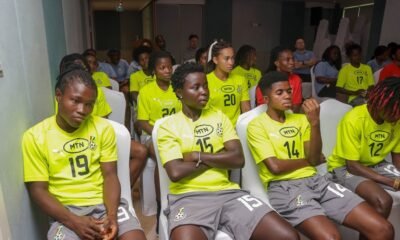News
Honouring a legend: Tourism minister hails Agya Koo Nimo’s legacy

In a heartfelt tribute to one of Ghana’s musical treasures, the Minister for Tourism, Culture and Creative Arts, Madam Abla Dzifa Gomashie, has lauded high-life maestro, Agya Koo Nimo, by highlighting his immense contribution to the country’s cultural heritage and national development.
The 94-year-old virtuoso, born Daniel Amponsah, is famed for pioneering the ‘Palm Wine’ music genre—a soulful blend of indigenous storytelling, melodic guitar rhythms, and age-old wisdom.
For over five decades, he has remained a cultural torchbearer, captivating audiences with both music and message.
During an official visit to the New Adwase residence of the legendary musician in Kumasi, Madam Gomashie, flanked by her Deputy, Mr Yussif Issaka Jajah, and the Ashanti Regional Minister, Dr Frank Amoakohene, presented a hamper and also made a cash donation to the nonagenarian.
She conveyed the gratitude of President John Dramani Mahama and the Ghanaian people for the maestro’s trailblasing role in shaping the nation’s music industry.
“Agya Koo Nimo didn’t just create music—he crafted identity, instilled pride, and charted a path for generations to follow,” the Minister stated.
A former lecturer at KNUST and founder of the iconic ‘Adadam Agofomma’ troupe, Agya Koo Nimo has been a fixture at university events and traditional ceremonies alike.
Despite retirement, he remains the lifeblood of the cultural group, continuing to inspire with humility and grace.
Dr Amoakohene reaffirmed the government’s ongoing efforts to spotlight creative industry pioneers, revealing that over 25 actors have already been acknowledged in the Ashanti region alone. The visit to Agya Koo Nimo marked a new phase of this outreach to musicians.
Gracious and visibly moved, the music legend expressed his appreciation to President Mahama and called for the establishment of a Creative Arts Museum to preserve and honour the works of Ghanaian musicians.
He also paid tribute to his 74-year-old wife, Madam Comfort Manu, and the members of his troupe for their enduring support.
The Minister’s delegation later toured the KNUST Department of Indigenous Arts and Technology, where she interacted with staff and students, and viewed an exhibition showcasing creative pieces made from local materials.
With this act of recognition, Ghana once again affirms that those who shaped its cultural soul will not be forgotten.
From Kingsley E. Hope
News
Man sentenced to 25 years for robbery at Manso Akwasiso

A 30-year-old man has been sentenced to 25 years imprisonment with hard labour by the Bekwai Circuit Court for his role in a 2022 robbery at a mining site at Manso Akwasiso in the Ashanti South Region.
The convict, Dominic Ofori, also known as Fanta, was arrested on 16th February 2026 after years on the run. He pleaded guilty before the Bekwai Circuit Court to robbery contrary to Section 149 of the Criminal Offences Act, 1960 Act 29, and was accordingly sentenced to 25 years imprisonment with hard labour.
On March 20, 2022, the Manso Adubia District Police received intelligence that a group of armed men from Manso Abodom were planning to attack a mining site at Manso Akwasiso to rob the owner of gold concentrate. Acting on the information, police mounted a coordinated operation and laid an ambush at the site.
At about 5:30 pm the same day, four-armed men arrived at the site, fired indiscriminately, and robbed the miners of their gold concentrate. The police team on surveillance intervened, resulting in an exchange of gunfire.
Three of the suspects, Abu Abubakar, Musah Latif, and Gideon Takyi, sustained gunshot wounds and were pronounced dead on arrival at St Martins Catholic Hospital at Agroyesum. Dominic Ofori escaped at the time but was later arrested and put before the court.
The Ashanti South Regional Police Command has assured the public of its continued commitment to combating violent crimes and bringing offenders to justice.
News
Ashanti police arrest man for publishing false news on TikTok

The Ashanti Regional Police Command has arrested 45-year-old Isaac Boafo, also known as “Duabo King,” for allegedly publishing false news intended to cause fear and panic.
Police said the arrest follows a viral TikTok video in which Boafo claimed that four officers at the Central Police Station in Kumasi engaged in inappropriate conduct with commercial sex workers during night patrols in Asafo.
Officers from the Police Intelligence Directorate (Ashanti Region) apprehended Boafo after receiving intelligence about the video.
During questioning, he admitted to creating the video to attract views and engagement online, and acknowledged that he could not prove the allegations.
Boafo also admitted making comments about the President of the Republic for content purposes and could not defend those statements.
He has been formally charged and is in detention as investigations continue.
The Ashanti Regional Police have warned the public against publishing or sharing false information on social media, noting that such acts can cause fear, panic, and damage reputations.
They said anyone found engaging in similar conduct will face legal action.
By: Jacob Aggrey














